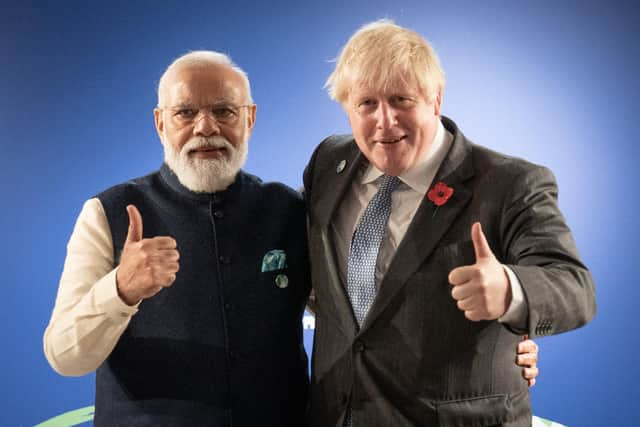COP26: World leaders set to promise an end to deforestation
At an event in Glasgow on Tuesday, countries spanning the northern forests of Canada and Russia to the tropical rainforests of Brazil, Colombia, Indonesia and the Democratic Republic of the Congo will endorse the Glasgow Leaders’ Declaration on Forest and Land Use.
This will be backed by almost £14 billion in public and private funding.
Advertisement
Hide AdAdvertisement
Hide AdPrime Minister Boris Johnson is expected to say: “Today, at COP26, leaders have signed a landmark agreement to protect and restore the earth’s forests.


“These great teeming ecosystems – these cathedrals of nature – are the lungs of our planet.
“Forests support communities, livelihoods and food supply, and absorb the carbon we pump into the atmosphere. They are essential to our very survival.
“With today’s unprecedented pledges, we will have a chance to end humanity’s long history as nature’s conqueror and instead become its custodian.”
The commitment will be supported by a pledge to provide £8.75bn in public finance from 12 countries, including the UK, from 2021 to 2025.
This will support activities in developing countries, including restoring degraded land, tackling wildfires and supporting the rights of indigenous communities.
President of Colombia Iván Duque said: “Colombia is proud to endorse the Glasgow Leaders’ Declaration on Forests and Land Use. The declaration is a landmark commitment from countries to work together to end deforestation and all land degradation within the next decade.
“Never before have so many leaders, from all regions, representing all types of forests, joined forces in this way and Colombia is committed to playing its part.
Advertisement
Hide AdAdvertisement
Hide Ad"We will enshrine in law a commitment to net-zero deforestation by 2030 – one of the most ambitious commitments in Latin America – and to protecting 30 per cent of our land and ocean resources by 2030.
“Now we must all work in partnership with businesses, the finance sector, smallholder farmers, indigenous peoples and local communities to create the conditions for forest-positive economies to grow and thrive.”
It comes as the Prime Minister warned that richer countries’ record on climate change “is not exactly stellar” and they had already “flunked” parts of the Paris Agreement.
Mr Johnson said that words without action “are absolutely pointless” as he hosted a discussion with world leaders, including US president Jo Biden, German chancellor Angela Merkel and Indian prime minister Narendra Modi.
Addressing the world leaders in his opening remarks, Mr Johnson said: “This is about all of us taking the concrete steps that will actually help the countries around the world that need it most.
“When it comes to tackling climate change, words – blah, blah, blah – without action, without deeds, are absolutely pointless and our record on deeds so far is not exactly stellar.”
Barbadian prime minister Mia Mottley separately urged world leaders to avoid a “death sentence” for developing countries, as she referenced the Paris summit pledge by richer nations to be raising $100 billion of private finance each year.
Citing her speech, Mr Johnson added: “That deadline has come and gone and it will be 2023 before we hit that target, so that was one of our very first post-Paris tests and we flunked it.
Advertisement
Hide AdAdvertisement
Hide Ad“Of course, getting there eventually is better than not getting there at all, but if we are late again with the rest of the 1.5C challenge, then we will be far too late.”
Monday also saw the US president say the COP26 summit must be the "moment we answer history's call".
He continued: “We know that none of us can escape the worse that’s yet to come if we fail to seize this moment.
“But, ladies and gentlemen, within the growing catastrophe I believe there’s an incredible opportunity, not just for the United States, but for all of us.
“We’re standing at inflection point in world history.
“We have the ability to invest in ourselves and build an equitable clean energy future, and in the process create millions of good-paying jobs and opportunities around the world.”
Mr Biden also admitted the US had not been “at the table” of combating climate change.
He told COP26 his administration would commit to meeting a goal of reducing US admissions by 50 per cent to 52 per cent below 2005 levels by 2030.
Mr Biden said this would “demonstrate to the world that the US is not only back at the table, but will hopefully lead by the power of our example”.
Advertisement
Hide AdAdvertisement
Hide AdHe added: “I know it hasn’t been the case and that’s why my administration is working overtime to show that our climate commitment is action and not words.”
The day also saw India pledge to cut its climate emissions to “net zero” by 2070.
In a historic announcement, the country’s prime minister Narendra Modi pledged India would reduce its projected carbon emissions by one billion tonnes between now and 2030, and reduce the carbon intensity of its economy by 45 per cent.
Giving a speech on India’s national climate action, Mr Modi told world leaders: “I am sure that the decisions taken in Glasgow will safeguard the future of generations to come and give them a safe and prosperous life.”
Scientists had warned the world needs to reach net-zero carbon emissions by 2050 to limit global warming to 1.5C, beyond which increasingly dangerous climate impacts from weather extremes to rising seas will be felt.
But developing countries, including India and China, have pushed back against calls for all nations to hit the 2050 net-zero mark, which requires cutting pollution as much as possible and offsetting any that remains with action to absorb carbon such as restoring forests.
Comments
Want to join the conversation? Please or to comment on this article.

